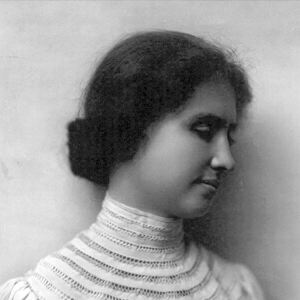
The first internationally renowned speaker at East Carolina Teachers Training School was, not surprisingly, a woman. On May 1, 1916, Helen Keller (1880-1968) delivered an address on campus, becoming the first of a succession of world-class speakers to lecture at East Carolina. Keller’s stop in Greenville was part of a state-wide speaking tour conducted in the spring of 1916. Other appearances were in Asheville, Charlotte, Greensboro, Raleigh, and Wilmington.
Keller's address was delivered in the main auditorium of the training school’s Administration and Classroom Building (later, Old Austin). The Greenville Reflector reported that a "very large audience" turned out for the Monday evening lecture. Most in the audience were anxious "to see and hear the most remarkable woman in the world." Despite having become deaf and blind when she was only nineteen months, Keller, a native of Tuscambia, Alabama, learned to communicate through sign language. She also developed the ability to speak with clarity, enabling her to spread her inspiring vision through national and international tours as a “platform speaker.”
Mrs. Anne Sullivan Macy (1866-1936), Keller’s teacher of twenty-five years, accompanied her. The subject of Keller's talk was "Happiness." Before addressing that theme, Keller recited the Twenty-Third Psalm so that the audience could become familiar with her patterns of speech. Mrs. Macy remained with Keller throughout the talk, communicating with Keller by letting her touch her lips and throat to feel the words that Macy said. In this way, Macy relayed questions and comments to Keller from the audience.
Keller emphasized that people should find happiness within themselves, but that this internal happiness is a byproduct of helping to make others happy. Thus, the "secret of happiness," Keller related, consists of "doing things for others." For this reason, Keller added, "We live for each other and by each other."
Politically, Keller was unique. In addition to being a professed socialist, Keller was an outspoken advocate of women’s suffrage. When asked by the ECTTS audience, "Are you a Suffragist?" Keller responded, "Yes" (very emphatically— as reported in the Training School Quarterly). To a follow-up question, "Why?" Keller stated, "Every up-to-date woman is."
Keller's most controversial stance in 1916 related to war and peace. Keller was an ardent pacifist. When asked by someone in the ECTTS audience, "How do you stand on the subject of 'preparedness?'" Keller responded, "Dead against it. Because it ultimately means war. But I would be for it if only Kaisers, Kings, and Congressmen were to do the fighting." When pressed by her questioner, "You do believe in some kind of preparedness do you not?" Keller stated, "Yes, the preparedness that promotes intelligence and efficiency; that includes good roads, schools, clean cities, and better wages for working men."
Keller’s address at ECTTS in 1916, just after the beginning of WWI, reveals the training school was doing more than training teachers: it was adding, in often controversial ways, to the intellectual and political atmosphere on campus and in the community.
Sources
- “Miss Helen Keller Charms Her Audience.” The News and Observer, May 3, 1916, p. 8.
- “Helen Keller Comes Here Tomorrow Night.” The Asheville Citizen-Times, April 19, 1916, p. 3.
- “Helen Keller.” The Charlotte Observer, April 25, 1916, p. 5.
Citation Information
Title: Helen Keller's Address at ECTTS
Author: John A. Tucker, PhD
Date of Publication: 10/31/2017